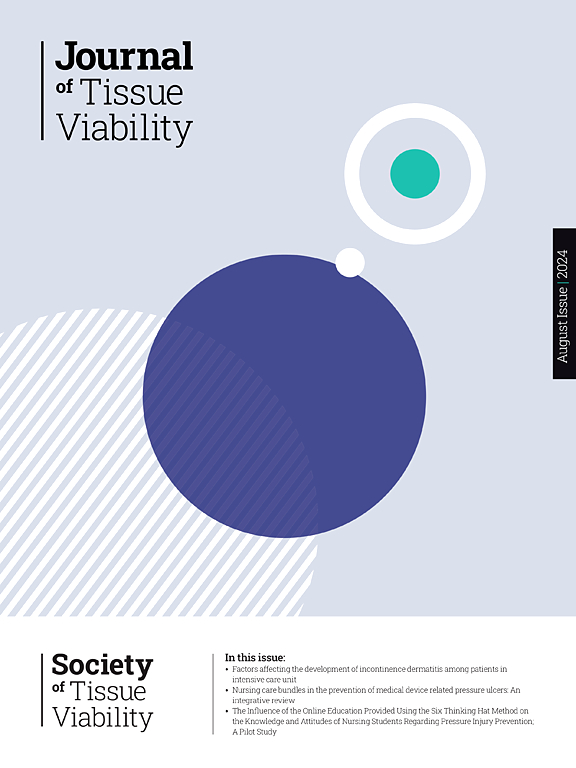糖尿病相关性足部溃疡患者的认知和生活质量
IF 2.4
3区 医学
Q2 DERMATOLOGY
引用次数: 0
摘要
目的本研究旨在比较糖尿病和糖尿病相关性足溃疡(DFU)患者与无活动性足溃疡的糖尿病对照组的认知功能和生活质量(QoL)。材料,方法于2022年12月至2024年8月进行横断面病例对照研究。42名患有糖尿病且DFU活跃的成年人与40名年龄和性别匹配的糖尿病但没有DFU的对照组进行了比较。采用Trail Making Test (TMT)评估认知功能,采用EuroQol EQ-5D-5L测量生活质量。统计分析包括Mann-Whitney U检验、逻辑回归和相关分析,以评估认知功能与生活质量之间的差异和关联。结果:与对照组相比,患有DFU的个体表现出明显较差的认知功能,完成TMT所需的时间大约是对照组的两倍。0.001)。DFU组死记硬背记忆(TMT-A)和执行功能(TMT-B)均明显受损。DFU组患者的生活质量评分也显著降低(p = 0.005),认知功能障碍与生活质量降低之间存在显著相关性(p = 0.01, r = - 0.29)。Logistic回归分析显示,TMT完成时间越长,DFU发生率增加4.13 (p <;0.001)。结论DFU患者认知功能明显受损,与较差的生活质量相关。这些发现强调需要将认知评估整合到DFU管理中,以优化依从性并改善患者预后。本文章由计算机程序翻译,如有差异,请以英文原文为准。
Cognition and quality of life in patients with a diabetes-related foot ulcer
Aim
This study aimed to compare cognitive function and quality of life (QoL) in individuals with diabetes and a diabetes-related foot ulcer (DFU) to a control group with diabetes and no active foot ulceration.
Materials & methods
A cross-sectional case-control study was conducted between December 2022 and August 2024. Forty-two adults with diabetes and an active DFU were compared to forty age- and sex-matched controls with diabetes but no DFU. Cognitive function was assessed using the Trail Making Test (TMT), and QoL was measured using the EuroQol EQ-5D-5L. Statistical analyses included Mann-Whitney U tests, logistic regression, and correlation analyses to evaluate differences and associations between cognitive function and QoL.
Results
Individuals with a DFU demonstrated significantly poorer cognitive function compared to controls, taking approximately twice as long to complete the TMT (p < 0.001). Both rote memory (TMT-A) and executive functioning (TMT-B) were significantly impaired in the DFU group. QoL scores were also significantly lower in the DFU group (p = 0.005), with a notable association between cognitive impairment and reduced QoL (p = 0.01, r = −0.29). Logistic regression indicated that longer TMT completion time was associated with 4.13 increased odds of DFU (p < 0.001).
Conclusions
Cognitive function is significantly impaired in individuals with DFU and is associated with poorer QoL. These findings highlight the need to integrate cognitive assessments into DFU management to optimise adherence and improve patient outcomes.
求助全文
通过发布文献求助,成功后即可免费获取论文全文。
去求助
来源期刊

Journal of tissue viability
DERMATOLOGY-NURSING
CiteScore
3.80
自引率
16.00%
发文量
110
审稿时长
>12 weeks
期刊介绍:
The Journal of Tissue Viability is the official publication of the Tissue Viability Society and is a quarterly journal concerned with all aspects of the occurrence and treatment of wounds, ulcers and pressure sores including patient care, pain, nutrition, wound healing, research, prevention, mobility, social problems and management.
The Journal particularly encourages papers covering skin and skin wounds but will consider articles that discuss injury in any tissue. Articles that stress the multi-professional nature of tissue viability are especially welcome. We seek to encourage new authors as well as well-established contributors to the field - one aim of the journal is to enable all participants in tissue viability to share information with colleagues.
 求助内容:
求助内容: 应助结果提醒方式:
应助结果提醒方式:


